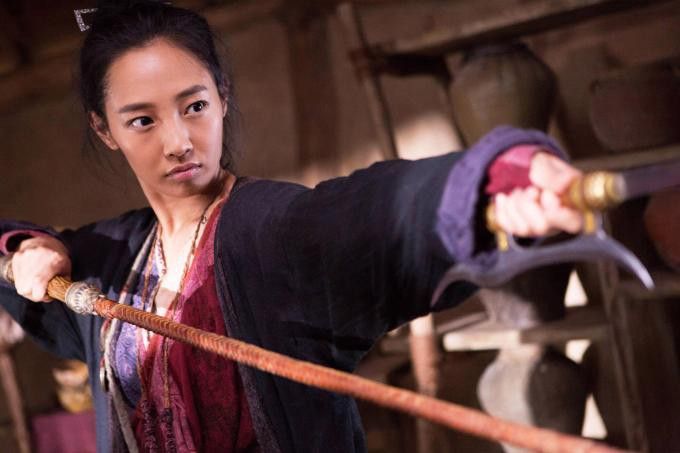Monster Hunt (Raman Hui, 2015)

An effects-based comic wuxia directed by Raman Hui, a Hong Kong native who has spent most of his career working on animated Hollywood films, most notably on some Shrek and Kung Fu Panda shorts and as co-director on Shrek the Third. This appears to be Hui’s first Chinese film as well as his first feature as a solo director, and it broke every record at the Chinese box office when it debuted in the summer of 2015.
Somewhat inspired by folk myths, the film is set sometime in the past when CGI monsters live separate from humans in borderland mountains and forests. Any monsters that encroach into human territory are rounded up by monster hunters. A civil war in the monster land forces their queen to flee to the humans along with her unborn child. A young man with a bad leg (played by Jing Boran), son of a famous monster hunter, comes across the queen and she makes him swallow the egg with the child in it. With the help of a monster-hunting young woman (Bai Baihe, just as elastically charming as she was in Go Away Mr. Tumor), he and the egg evade various pursuers until he can give birth, then the three of them form a family of sorts. Famous actors swirl in and out of the plot: Eric Tsang and Sandra Ng as a pair of monsters in disguise; Elaine Jin (star of several Edward Yang classics) as the boy’s kooky grandmother; Jiang Wu (who looks exactly like his brother, the actor and director Jiang Wen) as a rival monster hunter; Yao Chen (the actress with the most followers on China’s version of twitter) who is hilarious as a chef specializing in carving up monsters; and Tang Wei, making her fourth appearance in a 2015 film, as an unscrupulous gambler and monster-dealer.
In broad outline the story is very similar to other recent effects-based wuxias. Both Stephen Fung’s Tai Chi Zero/Tai Chi Hero films and Stephen Chow’s Journey to the West: Conquering the Demons pair an incompetent but kindly male lead with an adventurous and highly capable woman (Angelababy and Shu Qi, respectively). Monster Hunt takes the emasculation of the wuxia hero one step further by actually making him first pregnant and then the mother-figure in the pseudo-family the protagonist group forms. And unlike in previous films, Jing’s hero never unlocks hidden reserves of superpower: he triumphs in the end not by becoming a fully-actualized superhero, but kind of by accident: he gets stabbed by his father’s old rusty sword (I can’t even fathom the Freudian depths hidden there) which, with the help of a little blood from his monster-baby, suddenly turns shiny and powerful enough to defeat the final monster villain, which Jing accomplishes basically by falling into the bad guy.
Interesting and fun as it is (and it is definitely fun: while reliable vets Tsang and Ng mostly spin their wheels, Tang Wei is hilarious: her four performances of 2015 (this plus Blackhat, Office, A Tale of Three Cities) are all in wildly different registers–she’s proving to be not only one of the best but the most versatile actors in the world today) and as convincing as its digital creations are (the integration of the monsters into the live-action fight scenes is very well done and the physics make sense, at least by wuxia standards) it’s lacking the something extra that makes a truly great effects movie. The Tai Chi Zero films have an infectious spirit of comic book lunacy. Journey to the West has a surprisingly profound core of true belief. And 2015’s other great CGI smash hit from a part of the world US film journalists don’t bother to cover, SS Rajamouli’s Telugu epic Baahubali: The Beginning has a wildly imaginative approach to world-building, in both the scenic and narrative senses. Monster Hunt doesn’t have any of that kind of ambition. It’s content merely to be pleasantly, mostly harmless.
